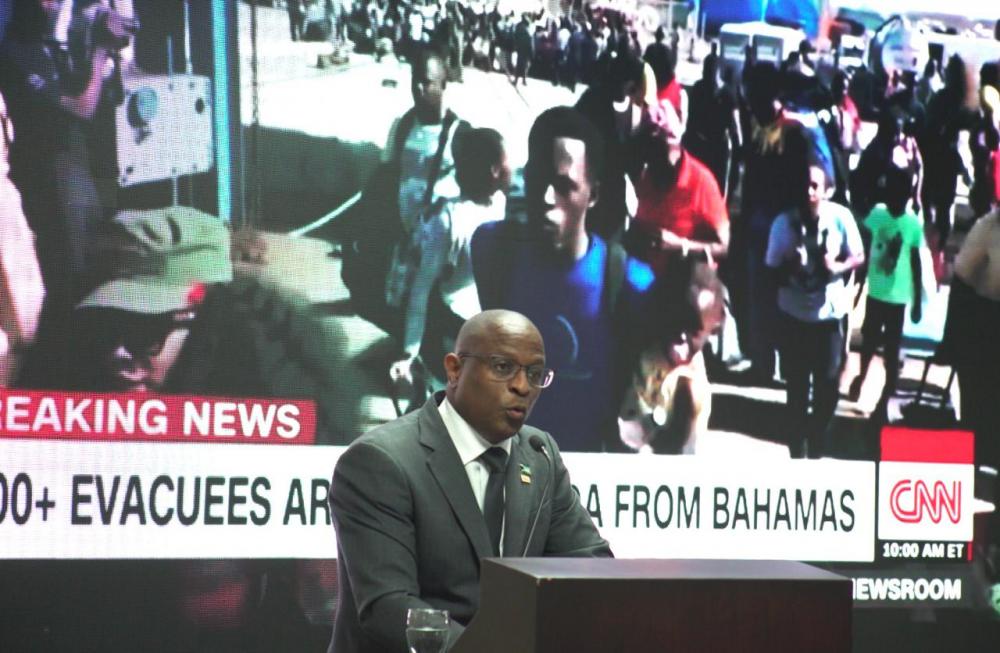Minister of Agriculture of the Bahamas: "Our efforts are to avoid becoming climate refugees"

San José, October 31, 2019 (IICA). The Minister of Marine Resources and Agriculture of the Bahamas, Michael Pintard, described Thursday in an emotional speech his country’s effort to recover from Hurricane Dorian, which devastated the Caribbean island nation last month.
“The carnage of Dorian over three days taught our citizens lessons about climate change and global warming that years of international commentary on greenhouse gas emissions have not been able to teach," Pintard told the during the Conference of Ministers of Agriculture 2019, held in San José, Costa Rica, and organized by the Inter-American Institute for Cooperation on Agriculture (IICA).
Dorian, the most powerful hurricane in the North Atlantic since the middle of the 19th century, took on the Caribbean archipelago and devastated the islands of Abaco and Grand Bahama, two of the three most populous in the country.
Both islands represent between 15 and 18% of GDP, said the minister, who highlighted the emotional impact caused by Category 5 storm.
“In recent weeks I have hears stories of a mother having to choose which child to save or risk losing both and her life as well, or a father watching his young son swept away and is helpless to save him or my neighbor watching his wife disappear beneath the water in their home totally unaware of yet another neighbor dying while her family, trapped out in the elements, held onto each other and a tree”, said Pintard, himself a survivor of the powerful hurricane.
“Our efforts are to avoid becoming climate refugees. Our daily struggle is to address the internal migration of our citizens due to the climatic occurrence”, he said.
The estimated cost of rebuilding the basic infrastructure will cost approximately $ 200 million, according to the minister. Losses to the private, commercial and private residences sector are estimated in between $2,5 and $3 billion dollars.
The minister detailed his country's difficulties in accessing financial aid before the worst disaster in its history.
“Our historical attempts to access concessional financing or grants as a high income per capita state have been exceptionally difficult and in many instances were flatly not considered despite the archipelago nature of our country where the vast majority of our 16 primary islands are rural in nature”, he said.
Preliminary estimates of damage to the agricultural sector for Abaco and Grand Bahama exceed $ 200 million, including loss of income, structure, equipment, vehicles, housing, crops, livestock and marine resources.
In addition, many companies have not reopened and cannot reopen in the short term.
Farmers lost all their animals in eastern Grand Bahama. Abaco Big Bird, the largest poultry producer, in the island of Abaco, lost 60,000 chickens, 90% of its lime crop and 50% of its avocado crop, and suffered severe damage to its infrastructure.

Pintard noted that IICA and the Bahamas Department of Agriculture began rehabilitation programs with some of the affected farmers, providing food for the animals that survived.
Soil fertility has been compromised by saltwater intrusion. Nine agricultural science programs involving poultry have suffered great losses.
Bahamas priority are reestablish livelihoods of farmers and fishers affected by Dorian within 12 months; re-establish apiary programs, create multiple abattoirs, promote innovation and new technology to support youth and women, adopting climate smart technologies in agriculture and marine resources, among others, said Pintard.
“We were brought to our knees but while there we prayed and rose to commence the work of reconstruction, regional cooperation and global stewardship," he said.
““My family lost its home. We were in it while it was being destroyed. Near death experiences crystalizes our vision, streamline your priorities and strengthens your resolve. (…) The priority is to get governments to articulate clear vision for the future of agriculture and drive it in conjunction with partners such as IICA while inviting the public to hold us into account for the public commitment made to do so”, he added.
More information:
Institutional Communication Division, IICA